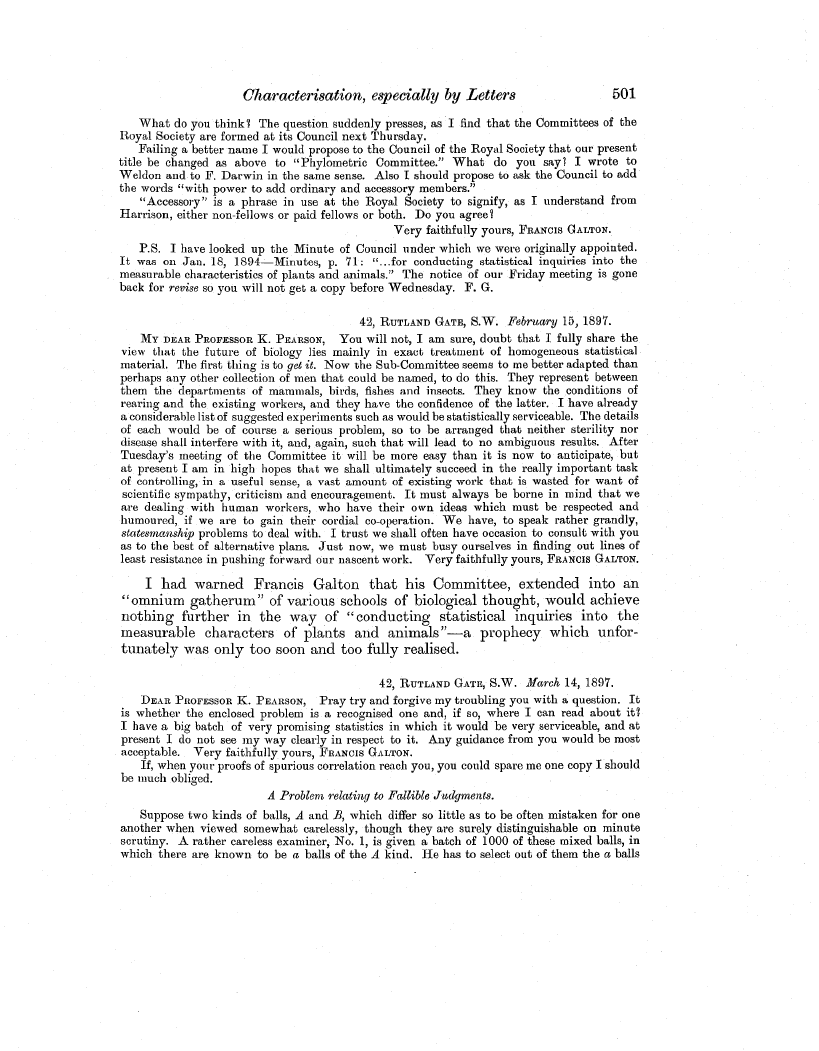| ||||||

OCR Rendition - approximate
Characterisation, especially by Letters 501 What do you think? The question suddenly presses, as I find that the Committees of the Royal Society are formed at its Council next Thursday. Failing a better name I would propose to the Council of the Royal Society that our present title be changed as above to "Phylometric Committee." What do you say? I wrote to Weldon and to F. Darwin in the same sense. Also I should propose to ask the Council to add the words "with power to add ordinary and accessory members." "Accessory" is a phrase in use at the Royal Society to signify, as I understand from Harrison, either non-fellows or paid fellows or both. Do you agree? Very faithfully yours, FRANCIS CALTON. P.S. I have looked up the Minute of Council under which we were originally appointed. It was on Jan. 18, 1894-Minutes, p. 71: "...for conducting statistical inquiries into the measurable characteristics of plants and animals." The notice of our Friday meeting is gone back for revise so you will not get a copy before Wednesday. F. G. 42, RUTLAND GATE, S.W. February 15, 1897. MY DEAR PROFESSOR K. PEARSON, You will not, I am sure, doubt that I fully share the view that the future of biology lies mainly in exact treatment of homogeneous statistical material. The first thing is to get it. Now the Sub-Committee seems to me better adapted than perhaps any other collection of men that could be named, to do this. They represent between them the departments of mammals, birds, fishes and insects. They know the conditions of rearing and the existing workers, and they have the confidence of the latter. I have already a considerable list of suggested experiments such as would be statistically serviceable. The details of each would be of course a serious problem, so to be arranged that neither sterility nor disease shall interfere with it, and, again, such that will lead to no ambiguous results. After Tuesday's meeting of the Committee it will be more easy than it is now to anticipate, but at present I am in high hopes that we shall ultimately succeed in the really important task of controlling, in a useful sense, a vast amount of existing work that is wasted for want of scientific sympathy, criticism and encouragement. It must always be borne in mind that we are dealing with human workers, who have their own ideas which must be respected and humoured, if we are to gain their cordial co-operation. We have, to speak rather grandly, statesmanship problems to deal with. I trust we shall often have occasion to consult with you as to the best of alternative plans. Just now, we must busy ourselves in finding out lines of least resistance in pushing forward our nascent work. Very faithfully yours, FRANCIS GALTON. I had warned Francis Galton that his Committee, extended into an "omnium gatherum" of various schools of biological thought, would achieve nothing further in the way of "conducting statistical inquiries into the measurable characters of plants and animals "-a prophecy which unfortunately was only too soon and too fully realised. 42, RUTLAND GATE, S.W. March 14, 1897. DEAR PROFESSOR K. PEARSON, Pray try and forgive my troubling you with a question. It is whether the enclosed problem is a recognised one and, if so, where I can read about it? I have a big batch of very promising statistics in which it would be very serviceable, and at present I do not see my way clearly in respect to it. Any guidance from you would be most acceptable. Very faithfully yours, FRANCIS GALTON. If, when your proofs of spurious correlation reach you, you could spare me one copy I should be much obliged. A Problem relating to Fallible Judgments. Suppose two kinds of balls, A and B, which differ so little as to be often mistaken for one another when viewed somewhat carelessly, though they are surely distinguishable on minute scrutiny. A rather careless examiner, No. 1, is given a batch of 1000 of these mixed balls, in which there are known to be a balls of the A kind. He has to select out of them the a balls
|